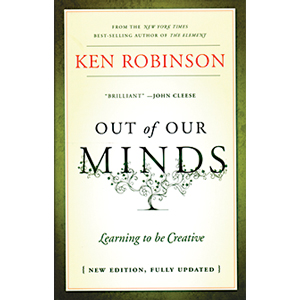
Out of Our Minds
 “Everywhere I go,” writes Sir Ken Robinson, “I find the same paradox. Most children think they’re highly creative; most adults think they’re not. This is a bigger issue than it may seem.” In his book, Out of Our Minds, Robinson argues that despite society’s preconceived notions creativity is not a rare talent, reserved for the special few. While the arts is one area creativity is a factor, Robinson believes it is not the only one. In fact, he claims, “Creativity is possible whenever we’re using our intelligence.”
“Everywhere I go,” writes Sir Ken Robinson, “I find the same paradox. Most children think they’re highly creative; most adults think they’re not. This is a bigger issue than it may seem.” In his book, Out of Our Minds, Robinson argues that despite society’s preconceived notions creativity is not a rare talent, reserved for the special few. While the arts is one area creativity is a factor, Robinson believes it is not the only one. In fact, he claims, “Creativity is possible whenever we’re using our intelligence.”
Therefore, Out of Our Minds is comprised of three fundamental themes:
- We are in the midst of a revolution.
- If we are to survive, we have to rethink and capitalize on our abilities.
- In order to do so, our organizations, especially our education systems, need to be transformed.
Essentially, Robinson believes that while “most educators have a deep commitment to helping students do their best,” deep-seated assumptions that drive our educational systems are no longer true, which results in an inordinate waste of talent. “Education is not a linear process of preparation for the future: it is about cultivating the talents and sensibilities through which we can live our best lives in the present and create the best futures for us all.”
Creativity is a complex concept, which can’t be taught through traditional means. Yet most reform methods, Robinson explains, aren’t designed to address this multi-faceted process. Instead, they look to increase access to education and raise standards. While Robinson recognizes these are admirable goals, they don’t address the need to alter our methods of instruction.
Out of Our Minds explains that “according to UNESCO, the number of people gaining formal educational qualifications in the next 30 years will exceed the gross total since the beginning of history. As a result, the market value of degrees is tumbling.” This has prompted, Robinson maintains, people to think that college begins in kindergarten.
However, Robinson argues that despite our linear approach to education, which mirrors our industrial roots more than it does the human experience, this is not the way to achieve success. He uses the ‘No Child Left Behind Act’ as an example, explaining “it has largely failed to meet its own objectives and has been widely condemned for demoralizing teachers and students, for inculcating a numbing culture of teaching to the test, and for encouraging schools to adapt the testing systems to avoid financial and other penalties. Meanwhile students are dropping out and teachers are leaving schools at alarming rates, while overall achievement in literacy and mathematics has scarcely budged.”
Part of the reason this has occurred, Robinson argues, is because of the elimination of creativity from school settings. “Since NCLB was passed into law, almost half of the school districts have eliminated or seriously reduced their arts programs, and the associated teaching posts.” Creativity, like the web of biodiversity, suffers when the system focuses on only a few disciplines that are deemed, unjustifiably, as more important in the educational hierarchy. As a result, Robinson writes, “NCLB is a prime example of what some holistic doctors call the septic focus: the tendency to look at a problem in isolation from its context.”
The result of this deficiency in education, Out of Our Minds argues, is a war for talent. “Employers say they want people who can think creatively, who can innovate, who can communicate well, work in teams and are adaptable and self-confident. They complain that many graduates have few of these qualities.” With schools taking an opposite approach to instruction and the “demand for new skills coming at a time when colleges are least able to adapt and provide them because growing student numbers restrict the time available for staff to offer personalized teaching,” Robinson says it’s no wonder our students aren’t succeeding.
“Graduates who find work in 2012 will not expect to be with the same company in 2050, or even that the company will still be around then. They may change not only jobs but also careers several times during their working lives,” maintains Robinson. Therefore, we must let go of the academic illusions that Robinson insists are causing the creative capacities of generations of people to be lost before it’s too late.
Don’t forget to like Parenting by the Book on Facebook for updates on blog posts.
Read my other blog Befriending Forty at http://befriendingforty.blogspot.com and find out what happens when the person you thought you’d be meets the person you actually became.






